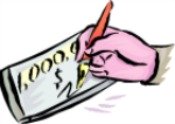Debt
Management

Debt management is probably something that is far down on our radar screen when we start out in life. Most of us grow up with dreams of having a better life than our parents. Many will purchase whatever they want without hesitation.
It can become very easy to start purchasing products and services that you feel you absolutely must have or simply want. It’s a snap to put off the expense by paying with borrowed money from credit cards or loans.
That is when the dream can quickly morph into a horror story if you are not careful with your spending. Debt can slowly creep up on you. Sometimes it comes when you are in a low point in your life.
It is a good idea to begin thinking about debt management early in life. A good way of thinking about it is… keep your debt within limits you can control.
Here are some signs that you are in grave danger of falling into a life of debt:
Spending more than you take in…
If you are having a hard time making enough money to make ends meet - you are most likely spending more than you are taking in. And, when your output is more than the input… your first inclination is to keep on spending. You will fall into a vicious cycle believing everything is fine until the debt is due. In order to fix this situation, you have to find a way to start generating a sustainable and consistent income all over again. Don’t spend more than you take in.
Not having a budget…
Budgeting is a critical key to debt management. When you don't know where the money is going… in or out, you are much more predisposed to get into debt. By making a budget of your finances, you will know how and where the money is coming in and going out. It will also quickly help you to see the best ways to save money.
You’ll soon realize that you can have “nice things” without sinking into a sea of debt. A budget will show you how you can do that. You will also be able to see how you can save money… so that you can make purchases with cash. Make a budget, starting now.
Believing the myth that you must go into debt to build a good credit rating…
Many financial experts consider this to be the largest problem with debt. Somewhere along the way, you might have been told that in order for you to purchase what you want - you must build up a great credit rating. But this isn't necessarily true. If you plan, budget and save then you don't need to accumulate debt in order to be in a position to have nice material possessions. Do not go into debt for the sake of gaining a “good credit rating.”
Not Having a Rainy Day Fund
A rainy day fund is money that you set aside for emergencies. For this fund, the bare minimum should be $1000. And, only touch it for emergencies. Don’t use your rainy day fund for a vacation or eating out at restaurants. Your budget should account for those expenses.
The rainy day emergency fund should be used for items such as emergency medical expenses or to help out during prolonged absence from work. Failing to have a rainy day fund is a recipe for disaster… and almost ensures that you will be in debt at one time or another. Create your rainy day fund.
If you give careful thought to these debt management warnings, you can prevent yourself from drowning in a sea of debt. You won't have to fight off debt collectors.
Go from Debt Management to Living In Abundance
Visit our Personal Development home page




New! Comments
Tell me your thoughts about what you just read here! Leave me a comment in the box below.